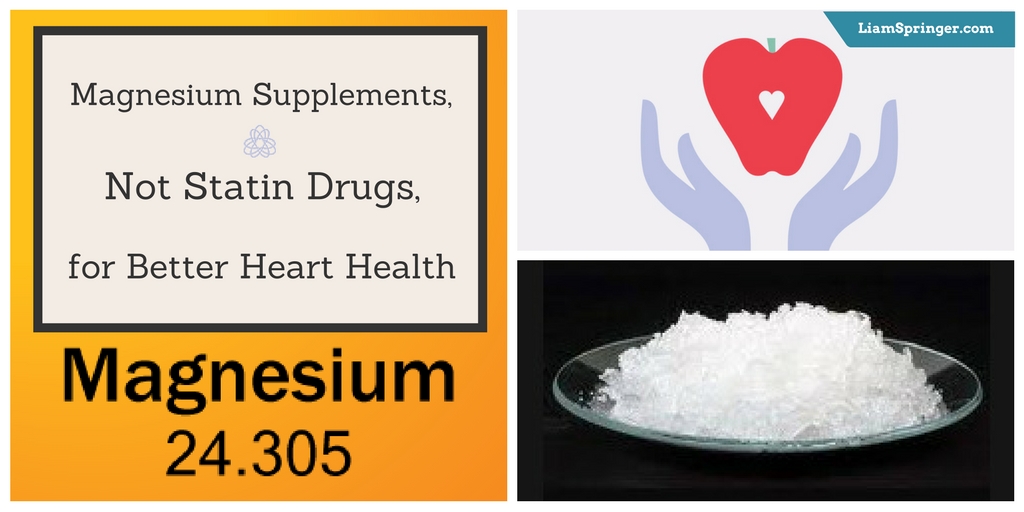
Heart disease has many contributing factors, including poor dietary habits, elevated stress, intestinal bacteria—and magnesium deficiency. It’s important to note that, despite popular belief, cholesterol alone is not to blame for causing clogged arteries and other forms of cardiovascular disease. In fact, it’s becoming increasingly apparent that cholesterol-lowering statin drugs are not the solution to heart disease. Keep reading to learn about the statin controversy, magnesium deficiency, and why magnesium supplements may be a far more effective aid in fighting the battle against heart disease.
First, a Word on the Statin Controversy
The statin controversy has gotten quite a bit of press recently.1 In a nutshell, there’s a lot of debate about whether cholesterol-lowering statin drugs are actually effective at reducing heart disease and improving life expectancy. There are a lot of red flags being raised over whether the supposed “benefits” of these medications are worth the risks in terms of the awful side effects—and increased overall mortality rate—they produce. For the first time, the medical community is calling for a reduction in the prescription of these cholesterol-lowering drugs.
Up to this point, we have failed to solve the heart disease riddle by eating lower saturated fat or removing cholesterol from our diets or blood. So what do we do?
Magnesium Deficiency and Supplementation
Magnesium deficiency, which is fairly prevalent even in wealthy countries, is one possible cause of heart disease.2 Magnesium intake is shown to be inversely correlated with the calcification of arteries, which is the underlying factor in nearly all cardiovascular disease.3-5 It is a single nutrient deficiency that has been conclusively shown to cause hardening and accumulation of plaque in the arteries.
Even if you are meeting the daily requirements for magnesium through your diet, you can still become deficient due to the rapid loss of magnesium from the cell under any sort of stress. The best way to restore that loss is by exceeding the daily requirements. However, this can be difficult because the foods within a high-quality diet do not easily allow for such intake. While a high-quality diet under many circumstances reduces the challenge of environmental stressors and so reduces the loss of magnesium in a modern life, it is likely that magnesium supplementation would aid in reducing heart disease.
Additional benefits of magnesium include: improved sleep, hormone balance, blood sugar regulation, blood pressure, calcium utilization, bone health, and reduced inflammation. Magnesium is also important for the function of many crucial enzymes and elegant metabolic pathways.
Tips for Finding Good Magnesium Supplements
Magnesium supplements are not all created equal. Magnesium carbonate and magnesium glycinate are good compounds for human intake. So look for those labels when you’re shopping for magnesium supplements. The glycinate form can also aid in reducing neurologic stress and relaxing the brain for restful sleep, so it’s a good idea to take it before bed—to help reduce general stress and slow magnesium loss. The carbonate form is easily absorbed and can lend carbon for the formation of carbon dioxide during metabolism, allowing for greater retention of cellular calcium. These are only two good options; by no means are they the only way to increase your magnesium intake. When considering high-quality magnesium supplements, a good website is toxinless.com.
To help prevent the causes of heart disease, consider taking a high-quality magnesium supplement. More importantly, remember to avoid fried foods and vegetable oils, eat a diet high in fruit and whole foods, and make lifestyle adjustments to help reduce your global stress load.
For more insights on the latest topics in health and nutrition, sign up for my monthly newsletter. Want to try a new workout method that’s great for spine health, strength and stability, and flexibility? Join us for ELDOA group classes right here in St. Louis!
References
- DuBroff R, de Lorgeril M. Cholesterol confusion and statin controversy. World J Cardiol 7, No. 7 (July 2015): 404-409. http://www.ncbi.nlm.nih.gov/pmc/articles/PMC4513492/
- Swaminathan R. Magnesium metabolism and its disorders. Clin Biochem Rev 24, No. 2 (May 2003): 47-66. http://www.ncbi.nlm.nih.gov/pmc/articles/PMC1855626/
- Hruby A, O’Donnell CJ, Jacques PF, et al. Magnesium intake is inversely associated with coronary artery calcification: the Framingham Heart Study. JACC Cardiovasc Imaging 7, No. 1 (Jan 2014): 59-69. http://www.ncbi.nlm.nih.gov/pubmed/24290571
- Gorgels TGMF, Waarsing JH, de Wolf A, et al. Dietary magnesium, not calcium, prevents vascular calcification in a mouse model for pseudoxanthoma elasticum. J Mol Med 88, No. 5 (May 2010): 467-475. http://www.ncbi.nlm.nih.gov/pmc/articles/PMC2859158/
- Rayssiguier Y. Role of magnesium and potassium in the pathogenesis of arteriosclerosis. Magnesium 3, No. 4-6 (1984): 226-238. http://www.ncbi.nlm.nih.gov/pubmed/6399344







Thanks for the mention and article, Liam.
It is a service to my readers to bring awareness to the resource you provide!
What dosage of magnesium carbonate would be effective for a 60 year old active female who follows a peaty diet?
It really varies however using symptoms of deficiency and taking magnesium in several forms until symptoms (like tight sore calves when you bend your ankle) are relieved is an idea. If just for supplementation taking around 300-500mg per day before bed is sufficient, and much less maybe required. Magnesium requirements can be fairly low maybe 200mg if you are not losing magnesium due to any form of metabolic stress and a diet high in fruit and dairy will help keep intake on the higher side. Making sure to have a little more than usual after highly active periods could prevent deficit.